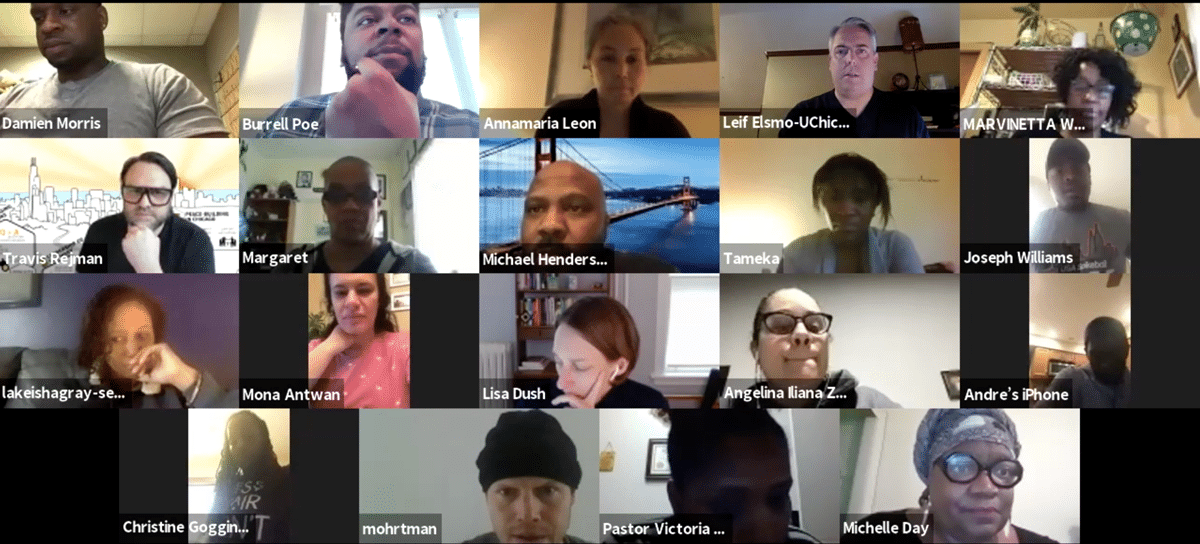Violence as an Adaptive Challenge
On Thursday, March 26, the Chicago Peace Fellows participated in a workshop titled ‘Violence as an Adaptive Challenge’ with staff members at the University of Chicago Medical Center’s Violence Recovery team. This is the second workshop in the GATHER course, and the Fellows discussed issues related to solving complex, amorphous problems in the communities they serve. They were joined by staff at the University of Chicago Medical Center for Community Health and Vitality, who shared useful information about staying safe from COVID-19 and answered the Fellows’ questions relating to how they can protect themselves and their neighbors. Due to the social distancing efforts going on in Chicago to stymie the spread of COVID-19, this workshop was conducted online via video conference software.

The Violence as an Adaptive Challenge workshop was conducted with the Violence Recovery team at the University of Chicago Medical Center. They started the call by explaining their role in the trauma center, which is to connect with victims of intentional violence, i.e. gunshot wounds, knife attacks and other injuries that come to the trauma center. When they connect with victims, they try to find resources in the hospital and community to help solve other problems they may have besides their injury such as housing, food insecurity or mental health. The program is meant to deal with what they call the Social Determinants of Violence so as to keep people from having to come back to the hospital. The program has been in operation for almost 2 years and started when the Level 1 trauma center opened in May 2018. They explained that they are one of the few violence recovery teams in the nation.
The Peace Fellows asked questions about how their operation works in the trauma center and how successful their work has been. The Fellows also asked about how their work connects with community-based organizations to provide a network of support for the individuals that come into the hospital’s care. The Fellows inquired about how they could collaborate with various community institutions such as the Chicago Police Department. The Fellows shared the various services they provided and offered to support the violence recovery team. Many of the violence recovery specialists are members of the community who have similar backgrounds to many of the victims of violence, particularly gun violence.
“One of the things we are big in is preventing reinjury [victims coming back to the trauma center with new injuries] risk,” explained Dre, a violence recovery specialist. “That starts as soon as they get in. We work to understand if they are in danger or if it is an ongoing situation.”
To round out the call, the Peace Fellows spoke with Dr. Doriane Miller, director of the Center for Community Health and Vitality. Dr. Miller explained basic information that community members need to know about the symptoms of COVID-19 and how the virus is transmitted. The Fellows asked questions and dispelled myths about who can contract the virus and whether certain home remedies are effective.
Please visit the University of Chicago Medicine website for more information. Or visit the City of Chicago COVID-19 Portal.
Peace Fellows Tour University of Chicago Crime Lab

On Friday, August 30, the Chicago Peace Fellows toured the University of Chicago Urban Labs to learn more about the work of the Crime Lab, hosted by Kimberly Smith, associate director of criminal justice initiatives.

Kim talked about how the Crime Lab started with the idea to leverage the intellectual capital of the University of Chicago to address violence in Chicago. In 2007, the University was reeling from the shooting death on their campus of an international student during an attempted robbery. Their solution was to ask what the University’s faculty members were good at and how could they use their talents to serve their surrounding community.
[quote]The University of Chicago is the home of more Nobel Prize winners than any other institution in the world, and the school is a hub for research of many kinds, scientific to historical. Could they use those techniques to encourage research on the causes and solutions to violence in the communities that surround the university?[/quote]
They began to work with community organizations to add value by providing research and evaluation support. They identified one organization that was producing tremendous results and helped them grow their programming, and they are working with several other groups across the city that are tackling issues of violence in the city to identify effective strategies.

Much of the meeting was spent fielding questions from the Chicago Peace Fellows about how the Crime Lab does its work. They asked about the Crime Lab’s work with the Chicago Police Department, particularly how the Crime Lab is working to support officers and their relationship to the community. Robert Biekman wanted to know about the Crime Lab’s analysis of the federal consent decree that is designed to change the policies and procedures of the Chicago Police Department.
Dr. Sokoni Karanja asked about accessing data on community policing programs, which began a conversation about data sharing and how the Crime Lab provides data to grassroots organizations to measure impact. Many of the Chicago Peace Fellows have been doing tremendous work in their respective communities for years and were open to utilizing the support of the University's researchers to document their efforts and learn more about what’s most effective.
The meeting was a great demonstration of how communities can work with institutions to solidify best practices and identify promising solutions to the myriad of issues that communities across Chicago face.
